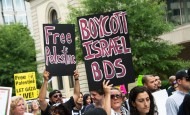NGOs, the EU, and Product Labeling: A First Step in BDS against Israel
.jpg)
- On November 2, 2015, a number of news sites reported that, on November 11, the EU will issue rules for the labeling of products exported from Israeli communities built over the 1967 ceasefire line (the “Green Line”). Politicized NGOs have been advocating for this move for several years as part of their BDS (boycott, divestment, and sanctions) campaigns.
- This EU/NGO policy is a blatant example of double standards made under the facade of human rights and international law. Other areas where the claim of “occupation” is made, such as in Cyprus, Western Sahara, and elsewhere, are not stigmatized by NGO campaigns, nor are they subject to EU labeling requirements.
- NGOs that claim to promote human rights cynically exploit the language of universal human rights to further their anti-Israel political agendas, and the product labeling issue is not exception. Accordingly, the rhetoric of “consumer choice” and “consistent policy” regarding settlement products serves to divert the debate from the real objective of BDS groups, which seek to dismantle Israel as the nation state of the Jewish people.
- BDS NGOs and activists push product labeling as a first step toward more punitive measures that go far beyond settlement goods (including wholly legal commercial activity that could be linked, no matter how trivially, to settlements). Their ultimate goal is a comprehensive boycott of Israel:
- In October 2012, 22 European funded NGOs released “Trading Away Peace: How Europe Helps Sustain Illegal Israeli Settlements,” a report repeating the BDS agenda and calling on the EU and national to impose various forms of economic sanctions on Israel. The publication’s “Recommended measures (for national governments and the EU as appropriate)” begin with “correct consumer labelling of all settlement products as a minimum measure” (emphasis added) and increase in severity to “ban imports of settlement products,” “exclude settlement products and companies from public procurement tenders,” and “prevent financial transactions to settlements and related activities.”
- FIDH and one of its Palestinian members, Al Haq, have been working together towards the goal of “Ensuring EU does not stop at labeling products from the settlements: obtain ban.”
- FIDH and other groups authored a “legal analysis” of EU policy regarding settlement products. The analysis concludes that labelling is “not sufficient to meet the international obligation of non-assistance” and that “the products made in settlements should be prohibited for sale.”
- In many cases calls for sanctions are initiated by former European politicians. For instance, in July 2015, the European Council on Foreign Relations (ECFR) a think tank established in 2007 by Martti Ahtisaari (Finland) and Joschka Fischer (Germany), published “EU Differentiation and Israeli settlements,” which calls for sanctions against Israeli entities (and certain individuals) that have activities in or apparent financial contacts with Israeli settlements. The report argues that the EU should extend this policy to the business and sports sectors. They argue that these forms of “differentiation” reflect EU policy, whereas, in reality, the issue was specifically negotiated between Israeli and European senior officials (after the release of the EU’s “Guidelines” in 2013) and was rejected.
- The influence of NGOs on EU policy in this regard is revealing in light of the harm to Palestinian workers in settlements who will be expected to lose their jobs if they close. It has been reported that a top EU official stated that “we are sorry about that, but we must look at the broader picture”. Similarly, a campaign led by Oxfam (an NGO funded by the British government) and other groups, led to the relocation of Soda Streams plant from Mishor Adumim (over the Green Line) to Lehavim junction (in the Negev), leading to the firing of most of the Palestinian employees.

